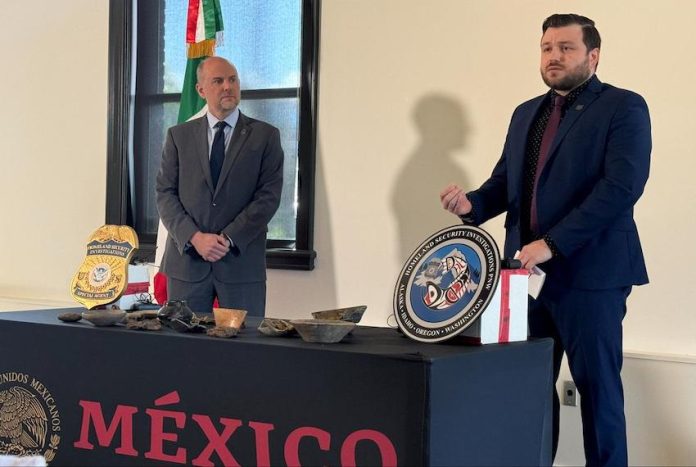The United States Department of Homeland Security (DHS) returned 35 pre-Columbian archaeological artifacts to Mexico’s government in a ceremony at the Mexican consulate in Seattle on June 5.
The artifacts were recovered from a privately held collection during an estate sale in 2023.
Godoy acknowledged the significance of the archaeological pieces and the relevance of returning them to their country of origin. He said the artifacts are a testimony to Mexico’s “glorious past,” and a “living reminder of the continuity of [Mexico’s] cultural identity through time.”
“We are proud to facilitate the return of these important artifacts to Mexico,” he said. “This act underlines our commitment to cultural heritage and international cooperation.”
International cooperation between the governments of Mexico and the United States facilitated the return of the artifacts. The Mexican Consulate in Seattle, led by the Consul for Protection and Legal Affairs Jorge López, collaborated with the DHS to carry out this effort.
Illegal trafficking of archaeological artifacts has been happening for centuries, the INAH said. To fight it, Mexico’s current administration has prioritized the repatriation of artifacts from abroad through the joint efforts of the ministries of Foreign Affairs and Culture, with the collaboration of judicial, military, customs and foreign affairs agencies.
From 2018 through March 2023, Mexico had repatriated a total of 11,505 archaeological artifacts from around the world. This year, Mexico has retrieved 30 artifacts from Los Angeles and 22 from Philadelphia.
Still, some significant historial objects from Mexico remain in collections abroad, like the penacho de Moctezuma in Vienna, a headdress of quetzal feathers that is believed to have belonged to the Mexica emperor. Others include the Florentine Codex, published in Tlatelolco by friar Bernardino de Sahagún; and the Cospi Codex, written before the Spanish conquest and containing scientific knowledge shared by Mexico’s Indigenous people.
Both codices are currently held in libraries in Italy.
Mexico News Daily
